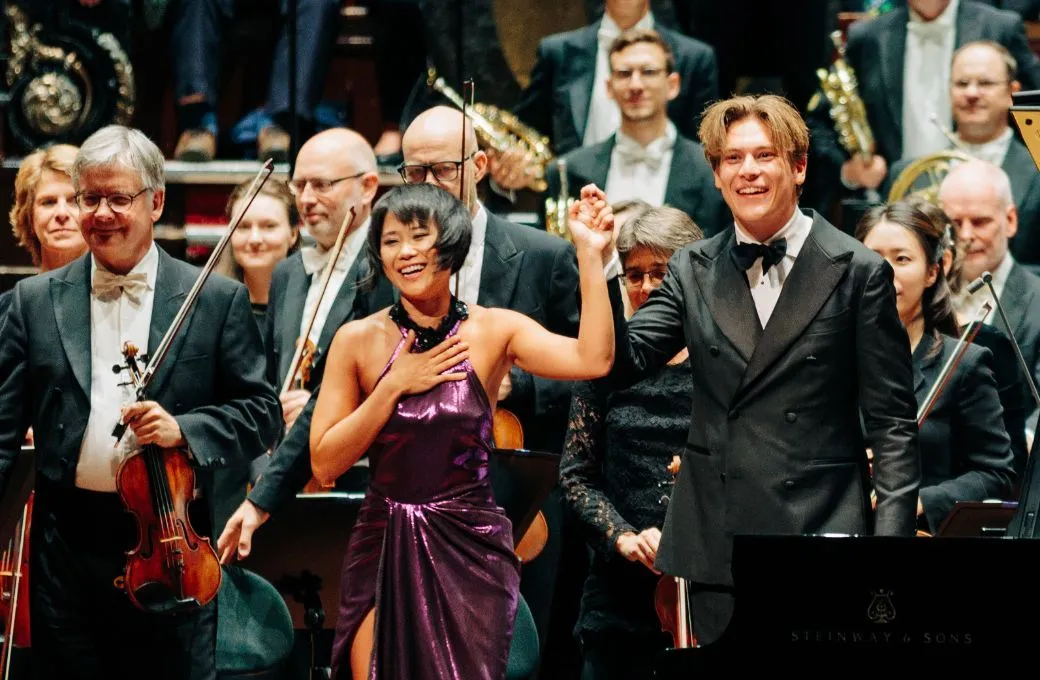Superstar performances from Yuja Wang, Klaus Mäkelä and the Oslo Phil in Edinburgh
by Anastasia

Not one, but two classical music superstars ensured a complete sell-out at the Usher Hall for this, the second of two concerts from the Oslo Philharmonic with their dynamic chief conductor, Klaus Mäkelä. Joining them to play both of Ravel’s piano concertos, acclaimed pianist Yuja Wang made this an unmissable event, an Edinburgh International Festival highlight.
Yuja Wang, renowned for her stunning technique and flamboyant wardrobe is a serious musician right at the top of her game. She completely dazzled with her mastery, opening with Ravel’s extraordinary Piano Concerto in D major for the Left Hand. From deep orchestral rumblings, she astonished in the early cadenza, five fingers climbing up the keyboard in flowing patterns as if limbering up for the percussive fireworks to come. Mäkelä guided his players through Ravel's mercurial score, from muted cor anglais and harp colours to a fizzing march with punchy percussion. Wang’s left hand bounded up and down the keys, scattering lightning-fast notes with relish and aplomb, her right hand, visibly resisting the urge to join its partner, sometimes gripped the wooden end of the keyboard to give her powerful purchase as the orchestra swelled.
A new concerto and a change of dress – a full-length number chosen in striking ‘Edinburgh Festival’ yellow – for Ravel’s Piano Concerto in G major. Here was a true musical partnership, Mäkelä and his players enjoying the jazz-tinted score, and yet with a slight turn of his hand he transformed the mood like opening the door to a magic garden. Wang, both hands now free, tumbled out her notes in wild abandon in the outer movements and almost stopped time in the beautifully simple melody in the central Adagio, her decorative fingerwork mesmerising in the cor anglais passage as the strings provided dusted icing. It was fascinating to watch the almost subliminal communication between conductor and pianist, micro cues as Mäkelä picked up Wang’s beat, the conductor a vital link between soloist and orchestra. As the bassoons began the final race, Mäkelä had sheer enjoyment written all over his face as Wang ended with a frantic tiger-paw, whirlwind finish. All played out, there were no encores for Edinburgh this time.
For Shostakovich’s Symphony no. 5 in D minor, the platform was jam-packed with players, a huge string section with central cellos, violas given prominence at the front, a veritable forest of double basses hugging the edge. Mäkelä, conducting without a score, was utterly mesmerising to watch as he took us on Shostakovich’s knife edge journey in a work that decided the composer's fate. It is easy to forget that Mäkelä is only 27 such is his total assurance and confidence. And what a rich string sound his Oslo orchestra has, cellos and basses a towering powerhouse, violas moving from nobly sad to truly fearsome, violins, soft and hesitant at the start, became a whirl of bows as Mäkelä built a palette of colours and mood.
In a truly magnificent performance Mäkelä squeezed out every drop of energy at key moments, the burnished Oslo heavy brass and stormy unison strings notching up the turmoil. Lighter moments emerged from the harps and there were fine solos from clarinet and the leader, with playful woodwind appearing in the second movement. There were many moments to enjoy from the biting cellos, two harps and flute beginning the cresting wave in the Largo to the turbocharged finale. This symphony is all about displaying outward Russian triumphalism while encompassing inner turmoil, with Mäkelä keeping undercurrents turbulent, he struck the ambiguous balance with thrilling perfection.
Source: https://bachtrack.com



